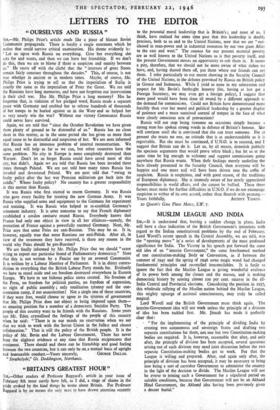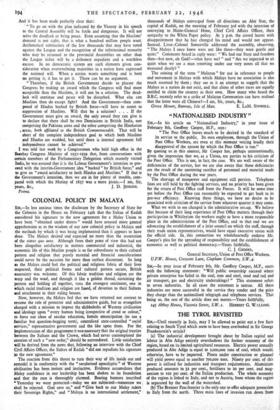MUSLIM LEAGUE AND INDIA
siR,—It is understood that, barring a sudden change in plans, India will have a clear indication of the British Government's intentions with regard to the Indian constitutional problems by the end of February. Lord Wavell's recent speech in the Central Assembly, we are told, was the " opening move " in'a series of developments of the most profound significance for India. The Viceroy in his speech put forward the same old idea of an " interim Government," the same foredoomed method of one constitution-making Body or Convention, as if between the summer of 1945 and the spring of 1946 some magic wand had changed fundamental principles and reconciled irreconcilables. It is futile to ignore the fact that the Muslim League is giving wonderful evidence of its power both among the classes and the masses, and is making democratic history by scoring almost too per cent. success in the all- India Central and Provincial elections. Considering the position in 1937, this wholesale rallying of the Muslim nation behind the Muslim League, this mighty upsurge of national consciousness, may truly be called magical.
Lord Wavell and the British Government must think again. The interim-Government idea will not work unless the principle of a division of idea has been tackled first. Mr. Jinnah has made it perfectly clear that: " For the implementing of the principle of dividing India by creating two autonomous and sovereign States and drafting two separate constitutions for them, not one but two Constitution-making bodies are required. It is, however, reasonable that after, and only after, the principle of division has been accepted, several questions arising out of such division may need joint discussion before the two separate Constitution-making bodies get to work. For that the League is willing and prepared. After, and again only after, the principle of division has been accepted, it may be necessary to bring into being a sort of caretaker Government to administer the country in the light of the decision to divide. The Muslim League will not be averse to joining such a Government for a stipulated period on suitable conditions, because that Government will not be an Akhand Hind Government, the Akhand idea having been previously given a decent buriaL" And it has been made perfectly clear that: • " To go on with the plan indicated by the Viceroy in his speech to the Central Assembly will be futile and dangerous. It will not solve the deadlock or bring peace. Even assuming that the Muslims' demand is not right, that is what a hundred million people want. Arithmetical subtraction of the few thousands that may have voted against the League and the recognition of the infinitesimal minority who may be returned to the provincial Assemblies on other than the League ticket will be a dishonest expedient and a worthless excuse. In no democratic system are such elements given con- sideration when overwhelming majorities in a nation have expressed the national will. When a nation wants something and is bent on getting it, it has to get it. There can be no argument.
" Therefore, if the British Government decide to placate the Congress by making an award which the Congress will find more acceptable than the Muslims, it will not be a solution. The dead- lock will continue and peace will be disturbed. What else can Muslims then do except fight? And the Government—then com- posed of Hindus backed by British force—will have to resort to suppression of Muslims. Will that be a solution? . . . If the Government must give an award, the only award they can give is to declare that there shall be two Dominions in British India, one comprising the Pakistan areas and the other comprising the Hindustan * areas, both affiliated to the British Commonwealth. That will be short of the complete independence goal to which both Muslims and Hindus are wedded, but until there is internal agreement full independence cannot be achieved."
I was told last week by a Congressman who held high office in the Bombay Congress Ministry of 1937-1939 that, from conversations with certain members of the Parliamentary Delegation which recently visited India, he was assured that it is the Labour Government's intention to pro- ceed with the interim-Government idea " backed " by British force," and to give an "award satisfactory to both Hindus and Muslims." If that is the Government's intention, then we are in for plenty of trouble, com- pared with which the Mutiny of 1857 was a mere picnic.—I am, Sir,































 Previous page
Previous page